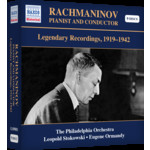
Rachmaninov: Pianist and Conductor - Legendary Recordings, 1919-1942
 $80.00
Out of Stock
$80.00
Out of Stock6+ weeks add to cart
SERGEI RACHMANINOV
Rachmaninov: Pianist and Conductor - Legendary Recordings, 1919-1942
Sergei Rachmaninov (piano) / Philadelphia Orchestra, Leopold Stokowski & Eugene Ormandy
[ Naxos Historical / 9 CD Box Set ]
Release Date: Monday 6 December 2010
This item is currently out of stock. It may take 6 or more weeks to obtain from when you place your order as this is a specialist product.
Sergey Vasilyevich Rachmaninov was born in Novgorod, Russia into a family of strong military traditions. A tendency to extravagance had depleted his father's fortunes and made it necessary to sell off much of their land, dissipating his wife's dowry, and as a result of this, Rachmaninov's childhood was largely spent at the one remaining family estate at Oneg, near Novgorod.
The reduction in family circumstances had at least
one happier result. When it became necessary to sell
this estate and move to St Petersburg, the expense of educating the boy for the Imperial Service proved too great. Rachmaninov could make use, instead, of his musical gifts, entering St Petersburg Conservatory at the age of nine with a scholarship. Showing no particular industry as a student and lacking the attention he needed at home, in 1885 Rachmaninov failed all his general subject examinations at the Conservatory and there were threats that his scholarship would be withdrawn. His mother, now separated from her husband and responsible for her son's welfare, arranged, on the
advice of Alexander Siloti, the well-known pianist and
Rachmaninov's cousin, that he should move to Moscow to study with Nikolay Sergeyevich Zverev, a renowned disciplinarian. In fact, Rachmaninov and two other boys lived with Zverev under a strict regime of rigorous practice. In this environment, however, the young Rachmaninov met and heard the greatest musicians of the time, including Anton Rubinstein, Anton Arensky, Sergey Taneyev and Pyotr Il'yich Tchaikovsky.
At the age of 15 Rachmaninov began piano studies with Siloti, and also took harmony with Arensky and counterpoint with Taneyev. In 1891 Siloti resigned from the Moscow Conservatory, and rather than have a new teacher for his final year, Rachmaninov was allowed to take his final piano exams a year early.
His growing interest in composition led to a quarrel with Zverev and removal to the house of his relations, the Satins. The following year he graduated from the composition class with his opera Aleko, and in the same year composed the notorious Prelude in C sharp minor, a piece that was to haunt him by its excessive popularity. His early career brought initial
success as a composer, halted by the failure of his First Symphony at its first performance in 1897, when it was conducted badly by Glazunov, apparently drunk at the time, and then reviewed in the cruellest terms by César Cui, who described it as a student attempt to depict in music the seven plagues of Egypt.
Rachmaninov busied himself as a conductor, accepting an engagement in this capacity with Mamontov's Moscow Private Russian Opera
Company. He was only able to return to composition after a course of treatment with Dr Nikolay Dahl, a believer in the efficacy of hypnotism. The immediate result was the second of his four piano concertos, a work that has proved to be one of the most immediately popular of all he wrote.
Tracks:
DISC 1
Solo Piano Recordings • 1
Victor Recordings, 1925-1942
DISC 2
Solo Piano Recordings • 2
Victor Recordings, 1925-1942
DISC 3
Solo Piano Recordings • 3
Victor Recordings, 1925-1942
DISC 4
Solo Piano Recordings • 4
The Thomas A. Edison Inc. Recordings, April 1919
DISC 5
Solo Piano Recordings • 5
Final Edison and First Victor Recordings, 1919-1923
DISC 6
Solo Piano Recordings • 6
Victor Recordings, 1922-1924
DISC 7
Piano Concertos
Historical Recordings 1934 • 1939 • 1940 • 1941
DISC 8
Piano Concertos
Historical Recordings 1929 • 1939 • 1940
DISC 9
Rachmaninov conducts Rachmaninov
Historical Recordings 1929 • 1939